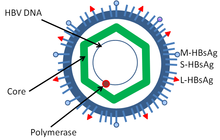
Hepatitis B is an infectious disease caused by the hepatitis B virus (HBV) which affects the liver. It can cause both acute and chronic infections. Many people have no symptoms during the initial infection. Some develop a rapid onset of sickness with vomiting, yellowish skin, tiredness, dark urine and abdominal pain. Often these symptoms last a few weeks and rarely does the initial infection result in death. It may take 30 to 180 days for symptoms to begin. In those who get infected around the time of birth 90% develop chronic hepatitis B while less than 10% of those infected after the age of five do. Most of those with chronic disease have no symptoms; however, cirrhosis and liver cancer may eventually develop. These complications result in the death of 15 to 25% of those with chronic disease.
Hepatitis B vaccine is a vaccine that prevents hepatitis B.The first dose is recommended within 24 hours of birth with either two or three more doses given after that. This includes those with poor immune function such as fromHIV/AIDS and those born premature. In healthy people routine immunization results in more than 95% of people being protected.

The structure of hepatitis B virus
Hepatitis B virus (HBV) is a member of the hepadnavirus family.
No comments:
Post a Comment